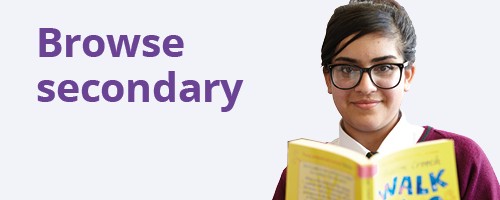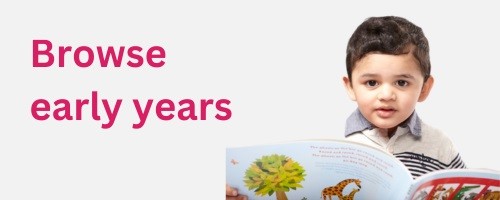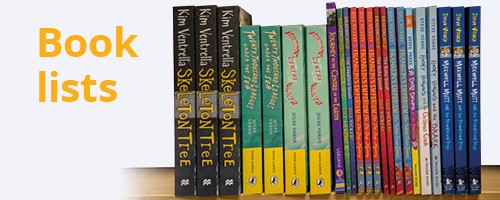Schools please note: due to the summer holidays we will automatically hold all school books and furniture orders due between Wednesday 16 July and Monday 1 September 2025. Delivery will resume from Tuesday 2 September 2025. If your school remains open for deliveries during the summer and you would like to receive your order during this time, please get in touch in advance by calling 0121 666 6646 or emailing hello@peters.co.uk.
For help, advice and telephone ordering call our team on 0121 666 6646
Are you sure you wish to delete this basket?()
This action cannot be undone.
Sorry, something went wrong
Please report the problem here.
CKG: Carnegie Shadowers' Choice 2021 Winner Manjeet Mann Q&A

March 16th 2022
Manjeet Mann is an actor and director as well as an award-winning author. Her debut novel, Run, Rebel was shortlisted for the Carnegie Medal last year, and went on to win the Shadower's Choice Award. Her second novel, one found within PSHE books for primary schools, The Crossing, tells the story of a teenage girl struggling with her mother's death, and an Eritrean refugee who find hope when fate throws them together. The Crossing is shortlisted for the Carnegie Medal in 2022. These inclusive books are now an excellent addition for schools in their books for curriculum.
Q: Run Rebel was shortlisted for the Carnegie Medal in 2021, and went on to win the Shadowers’ Choice Award – what did it mean to you to win?
I was over-the-moon to win the Shadowers’ Choice Award. It meant a lot because it’s voted for by students so to get their stamp of approval and knowing that it had resonated with so many young readers really does mean the world.
Q: Run Rebel is a verse novel; how do the themes you cover in the novel (alcoholism and domestic violence) lend itself to representation in this form? Are there any challenges when writing in verse?
What I love about verse novels, and it’s perhaps what others resonate with too is how deeply characters can express themselves and how immediate they feel, therefor I think they really lend themselves to covering darker subject matter. I know a lot of messages I get about Run, Rebel often mention how raw and honest the writing is. I find this is the case with most verse novels I’ve read. I often say that reading a verse novel feels like a punch in the gut! That’s the beauty of poetry I guess. It has that immediate, visceral impact which allows you to write about extreme emotional topics without the need to overly explain things. You can touch upon subjects and allow the reader to fill in the blanks. They literally leave (white) space and silences for the reader to read-between-lines and fill in the gaps which traditional novels don’t do, which in turn lends itself to that raw, deeper emotional impact that readers often talk about.
The biggest challenge when writing a verse novel tends to be in the edit. Cutting down the lines until you are left with what is truly essential. It is vital that you keep the pace and rhythm in a verse novel so you often have to ‘kill your darlings.’
Q: Why were you compelled to write about these themes?
Everything I write about is a lived experience to some extent. Although Run, Rebel is not 100% autobiographical it is a story that is very familiar to me, but I honestly didn’t think it was an interesting subject to write about until I started getting involved in community work and I had lots of women telling me their stories which resonated with my own. It felt as though there was something there to write about. A story that hadn’t been told before. A story that had the power to help others in similar situations and a story that could help build empathy and understanding.
Q: Did you always want to write, even from a young age?
Writing was never something I imagined doing, I always wanted to act. Ever since my first nativity aged five. All the girls wanted to play Mary, not me. Mary didn’t say anything, plus she just hid behind Joseph. I wanted to be centre stage with ALL the lines. The narrator is where it’s at folks!
Q: Which books did you enjoy reading as a young person, and what was it that stood about these – do you feel any have influenced your own work?
As a young person I devoured every single Roald Dahl, Jill Murphy and Judy Blume book. They were all fast paced and fun. I shared a room with my sister and she never allowed me to have my bedside light on, so, as my bed was under the window, I’d stick my head under the curtain and literally read under moonlight! The first book that blew my mind was actually ‘Anita and Me’ by Meera Syal. Here’s a story about an eleven-year-old Sikh girl, from a working-class family in the Black Country. Meena WAS me. That book taught me the power of representation and as an author that’s something that drives me.
Q: The Carnegie Medal is an award judged by Qualified Librarians – what have libraries meant to you and why do you think they’re important?
Libraries have always meant a lot to me. As a child I didn’t come from a house that had books. As in we didn’t have a bookshelf full of books that we owned, so the library was really important. Every week my mum would take me and my sisters down to the local library and we would spend the entire morning there reading and eventually picking the 8 books we were going to take home with us. I always found the whole experience quite magical and I still do. The library was always so quiet and there was a collective sense of joy and wonder, like, what am I going to learn? Where am I going to travel? Which stories will make me laugh or cry? It was the opposite of what home was for me, so it was important to have that quiet and feeling of safety. They still do feel very safe, wherever I might be in the country I try and visit the local library. One always feels safe in a library.
The Crossing is out now.
Follow Manjeet on Twitter @ManjeetMann and Instagram @manjeet_k_mann.









